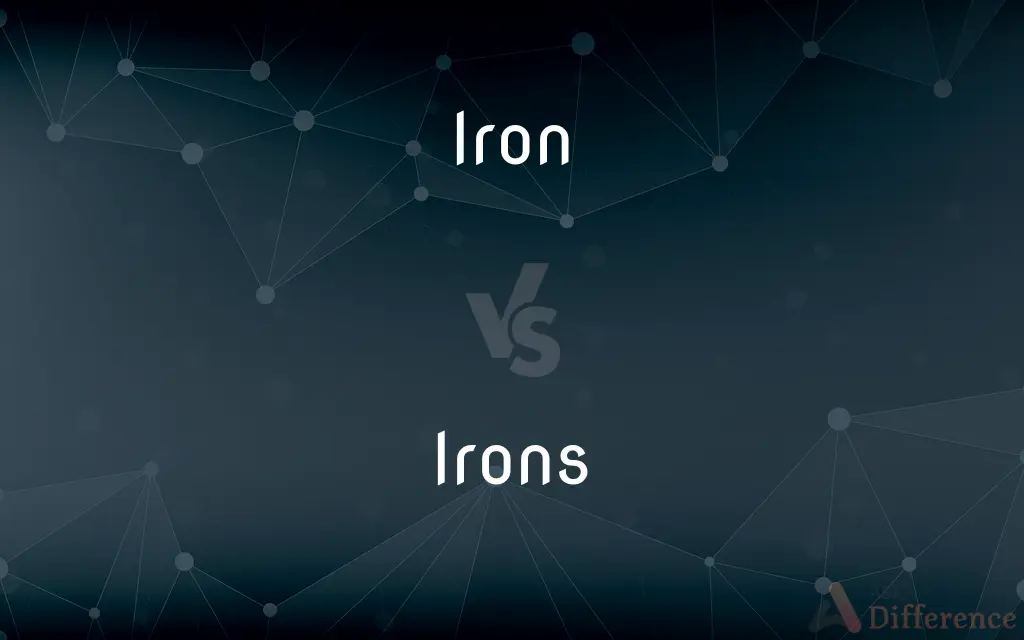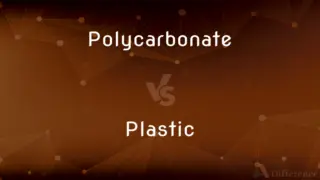Iron vs. Irons — What's the Difference?
By Tayyaba Rehman & Maham Liaqat — Updated on April 4, 2024
Iron is a chemical element and metal used in various applications, while "irons" typically refers to tools or devices made of iron, including golf clubs, branding tools, or handcuffs.

Difference Between Iron and Irons
Table of Contents
ADVERTISEMENT
Key Differences
Iron, represented by the symbol Fe and atomic number 26, is a chemical element and one of the most abundant metals on Earth, widely used in construction, manufacturing, and for making steel.On the other hand, the term "irons" is plural and generally refers to objects or tools made predominantly of iron or its alloys.
While the elemental iron is fundamental to industrial applications and is also essential for human health as a component of hemoglobin, "irons" as tools serve specific purposes based on their design and the context in which they are used. Golf irons, for instance, are designed for different types of shots in the game of golf, varying in size, shape, and angle for precision and control. Branding irons have been used historically for marking livestock with a unique symbol to denote ownership, and handcuffs are used for restraint in law enforcement.
The difference in usage illustrates the versatility of iron as a material. The singular form "iron" highlights its scientific and industrial significance, encompassing its various forms and uses in a broad sense. Conversely, "irons" in the plural form showcases the specific applications and tools made from this versatile metal, emphasizing the practical and sometimes specialized uses in everyday life and specific fields.
Understanding this distinction is essential when discussing various topics, ensuring clarity whether referring to the metal itself in a general or scientific context, or the tools and objects crafted from it in everyday language and specific industries.
Comparison Chart
Definition
A chemical element and metal (Fe, atomic number 26).
Tools or devices made of iron or its alloys.
ADVERTISEMENT
Examples
Used in construction, manufacturing, and as a dietary mineral.
Golf clubs, branding tools, handcuffs.
Properties
Magnetic, conducts heat and electricity, strong.
Specific to tool use: shape, size, durability.
Usage Context
Broad, including industrial and biological roles.
Specific applications, such as sports or security.
Representation
Singular, referring to the element or material.
Plural, referring to a collection or type of tools.
Compare with Definitions
Iron
A strong, magnetic metal.
Iron beams are used in constructing buildings.
Irons
Household appliances.
She ironed her clothes with a steam iron.
Iron
Essential dietary mineral.
Spinach is a good source of iron.
Irons
Branding tools.
The ranch uses custom irons for its cattle.
Iron
Conducts electricity.
Iron is used in the cores of transformers.
Irons
Historical torture devices.
Irons were used to restrain prisoners.
Iron
Magnetic material.
Iron filings align with magnetic fields.
Irons
Golf club type.
He chose a seven-iron for the mid-range shot.
Iron
Basis for steelmaking.
Iron ore is smelted to produce steel.
Irons
Handcuffs.
The officer placed the suspect in irons.
Iron
Iron () is a chemical element with symbol Fe (from Latin: ferrum) and atomic number 26. It is a metal that belongs to the first transition series and group 8 of the periodic table.
Irons
Symbol Fe A silvery-white, lustrous, malleable, ductile, magnetic or magnetizable, metallic element occurring abundantly in combined forms, notably in hematite, limonite, magnetite, and taconite, and used alloyed in a wide range of important structural materials. Atomic number 26; atomic weight 55.845; melting point 1,538°C; boiling point 2,861°C; specific gravity 7.874 (at 20°C); valence 2, 3, 4, 6. See Periodic Table.
Iron
Symbol Fe A silvery-white, lustrous, malleable, ductile, magnetic or magnetizable, metallic element occurring abundantly in combined forms, notably in hematite, limonite, magnetite, and taconite, and used alloyed in a wide range of important structural materials. Atomic number 26; atomic weight 55.845; melting point 1,538°C; boiling point 2,861°C; specific gravity 7.874 (at 20°C); valence 2, 3, 4, 6. See Periodic Table.
Irons
An implement made of iron alloy or similar metal, especially a bar heated for use in branding, curling hair, or cauterizing.
Iron
An implement made of iron alloy or similar metal, especially a bar heated for use in branding, curling hair, or cauterizing.
Irons
Great hardness or strength; firmness
A will of iron.
Iron
Great hardness or strength; firmness
A will of iron.
Irons
(Sports) Any of a series of golf clubs having a bladelike metal head and numbered from one to nine in order of increasing loft.
Iron
(Sports) Any of a series of golf clubs having a bladelike metal head and numbered from one to nine in order of increasing loft.
Irons
A metal appliance with a handle and a weighted flat bottom, used when heated to press wrinkles from fabric.
Iron
A metal appliance with a handle and a weighted flat bottom, used when heated to press wrinkles from fabric.
Irons
A harpoon.
Iron
A harpoon.
Irons
Irons Fetters; shackles.
Iron
Irons Fetters; shackles.
Irons
A tonic, pill, or other medication containing iron and taken as a dietary supplement.
Iron
A tonic, pill, or other medication containing iron and taken as a dietary supplement.
Irons
Made of or containing iron
Iron bars.
An iron alloy.
Iron
Made of or containing iron
Iron bars.
An iron alloy.
Irons
Strong, healthy, and capable of great endurance
An iron constitution.
Iron
Strong, healthy, and capable of great endurance
An iron constitution.
Irons
Inflexible; unyielding
Iron resolve.
Iron
Inflexible; unyielding
Iron resolve.
Irons
Holding tightly; very firm
Has an iron grip.
Iron
Holding tightly; very firm
Has an iron grip.
Irons
To press and smooth with a heated iron
Iron clothes.
Iron
To press and smooth with a heated iron
Iron clothes.
Irons
To remove (creases) by pressing.
Iron
To remove (creases) by pressing.
Irons
To put into irons; fetter.
Iron
To put into irons; fetter.
Irons
To fit or clad with iron.
Iron
To fit or clad with iron.
Irons
To iron clothes.
Iron
To iron clothes.
Irons
Plural of iron
Iron
(uncountable) A common, inexpensive metal, silvery grey when untarnished, that rusts, is attracted by magnets, and is used in making steel.
Irons
(dated) shackles
Iron
A metallic chemical element having atomic number 26 and symbol Fe.
Irons
(nautical) A lack of forward motion. en
Iron
Any material, not a steel, predominantly made of elemental iron.
Wrought iron, ductile iron, cast iron, pig iron, gray iron
Irons
(equestrianism) The stirrups.
Iron
(countable) A tool or appliance made of metal, which is heated and then used to transfer heat to something else; most often a thick piece of metal fitted with a handle and having a flat, roughly triangular bottom, which is heated and used to press wrinkles from clothing, and now usually containing an electrical heating apparatus.
Irons
Metal shackles; for hands or legs
Iron
(usually plural, irons) shackles.
Iron
(slang) A firearm, either a long gun or a handgun.
Iron
(uncountable) A dark shade of the color silver.
Iron
(golf) A golf club used for middle-distance shots.
Iron
Used as a symbol of great strength or toughness, or to signify a very strong or tough material.
A will of iron
He appeared easygoing, but inside he was pure iron.
Iron
(weightlifting) Weight used as resistance for the purpose of strength training.
He lifts iron on the weekends.
Iron
A meteorite consisting primarily of metallic iron (mixed with a small amount of nickel), as opposed to one composed mainly of stony material.
Irons and stony irons can be much larger than stony meteorites and are much more visually striking, but make up only a few percent of all meteorites.
Iron
A safety curtain in a theatre.
Iron
Dumb bombs, those without guidance systems.
Iron
(not comparable) Made of the metal iron.
Iron
(figuratively) Strong as of will, inflexible.
She had an iron will.
He held on with an iron grip.
An iron constitution
Iron men
Iron
(transitive) To pass an iron over (clothing or some other item made of cloth) in order to remove creases.
Iron
To shackle with irons; to fetter or handcuff.
Iron
(transitive) To furnish or arm with iron.
To iron a wagon
Iron
The most common and most useful metallic element, being of almost universal occurrence, usually in the form of an oxide (as hematite, magnetite, etc.), or a hydrous oxide (as limonite, turgite, etc.). It is reduced on an enormous scale in three principal forms; viz., cast iron, steel, and wrought iron. Iron usually appears dark brown, from oxidation or impurity, but when pure, or on a fresh surface, is a gray or white metal. It is easily oxidized (rusted) by moisture, and is attacked by many corrosive agents. Symbol Fe (Latin Ferrum). Atomic number 26, atomic weight 55.847. Specific gravity, pure iron, 7.86; cast iron, 7.1. In magnetic properties, it is superior to all other substances.
Iron
An instrument or utensil made of iron; - chiefly in composition; as, a flatiron, a smoothing iron, etc.
My young soldier, put up your iron.
Iron
Fetters; chains; handcuffs; manacles.
Four of the sufferers were left to rot in irons.
Iron
Strength; power; firmness; inflexibility; as, to rule with a rod of iron.
Iron
An iron-headed club with a deep face, chiefly used in making approaches, lifting a ball over hazards, etc.
Iron
Of, or made of iron; consisting of iron; as, an iron bar, dust.
Iron
Resembling iron in color; as, iron blackness.
Iron
Like iron in hardness, strength, impenetrability, power of endurance, insensibility, etc.;
Iron
Rude; hard; harsh; severe.
Iron years of wars and dangers.
Jove crushed the nations with an iron rod.
Iron
Firm; robust; enduring; as, an iron constitution.
Iron
Inflexible; unrelenting; as, an iron will.
Iron
Not to be broken; holding or binding fast; tenacious.
Iron
To smooth with an instrument of iron; especially, to smooth, as cloth, with a heated flatiron; - sometimes used with out.
Iron
To shackle with irons; to fetter or handcuff.
Iron
To furnish or arm with iron; as, to iron a wagon.
Iron
A golf club that has a relatively narrow metal head
Iron
Metal shackles; for hands or legs
Iron
Implement used to brand live stock
Iron
Home appliance consisting of a flat metal base that is heated and used to smooth cloth
Iron
Press and smooth with a heated iron;
Press your shirts
Iron
Extremely robust;
An iron constitution
Common Curiosities
What is iron used for?
Iron is used in construction, manufacturing, steel production, and as an essential nutrient in diets.
Why are some golf clubs called irons?
Golf clubs are called "irons" due to their metal heads, designed for a range of shots based on their size and shape.
Can the term "irons" refer to something other than golf clubs?
Yes, "irons" can refer to branding tools, handcuffs, or any tool made of iron or its alloys.
How does iron differ from steel?
Iron is a chemical element, while steel is an alloy of iron with carbon and other elements, offering enhanced strength and durability.
How are golf irons categorized?
Golf irons are categorized by their numbers, which indicate the loft angle, affecting the distance and trajectory of the ball.
What are the environmental impacts of iron mining?
Iron mining can affect landscapes, water quality, and biodiversity, necessitating sustainable practices and remediation efforts.
Is iron magnetic?
Yes, iron is magnetic, making it useful in various applications, including motors and generators.
What historical uses did irons have?
Historically, "irons" were used for restraint in prisons, as torture devices, or in domestic settings for clothing and linens.
Can iron be recycled?
Yes, iron is highly recyclable, often reused in manufacturing and construction, reducing the need for new raw materials.
What does putting someone in irons mean?
It colloquially means to handcuff someone, typically used in law enforcement or historical contexts.
Are all irons made of iron?
While historically made of iron, modern "irons" (tools or appliances) can be made from various metals or alloys.
How are branding irons used?
Branding irons are heated and applied to livestock skin to mark ownership or identification.
What role does iron play in technology?
Iron is crucial in technology, used in electronic components, machinery, and as a core material in electromagnets.
How is dietary iron deficiency addressed?
Iron deficiency is addressed through diet changes or supplements, emphasizing iron-rich foods like meats and leafy greens.
Share Your Discovery

Previous Comparison
Polycarbonate vs. Plastic
Next Comparison
Sleigh vs. SledgeAuthor Spotlight
Written by
Tayyaba RehmanTayyaba Rehman is a distinguished writer, currently serving as a primary contributor to askdifference.com. As a researcher in semantics and etymology, Tayyaba's passion for the complexity of languages and their distinctions has found a perfect home on the platform. Tayyaba delves into the intricacies of language, distinguishing between commonly confused words and phrases, thereby providing clarity for readers worldwide.
Co-written by
Maham Liaqat













































